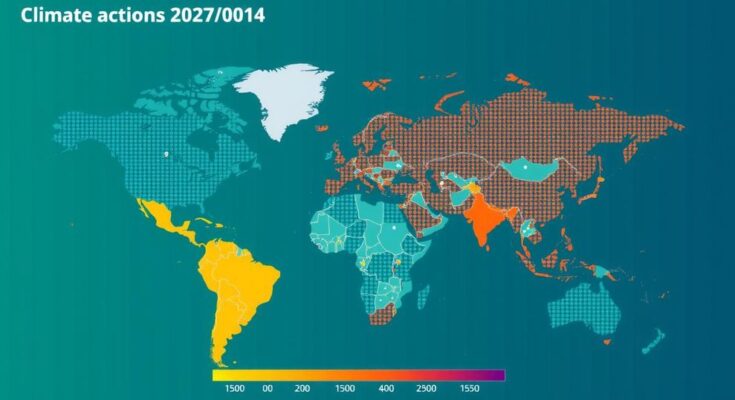The 2024 global election year reveals a troubling decline in climate action commitment, with populist victories indicating a shift away from environmental priorities despite worsening climate disasters. Political analysis suggests a regression in public urgency for addressing climate issues, framing them instead as secondary to economic concerns. The recent COP29 summit exemplifies this challenge with minimal progress evident in international climate negotiations.
The global electoral climate of 2024 reflects a concerning trend where, despite experiencing severe climate extremes, many countries exhibit a waning commitment to addressing the climate crisis. Significant political victories, such as those of Donald Trump in the United States and climate-skeptic politicians in Europe, highlight a growing populist backlash against climate action. Political analyst Catherine Fieschi indicates that this deterioration in public commitment to climate initiatives has intensified over the past few years, exacerbated by the COVID-19 pandemic and geopolitical tensions, pushing climate issues down the agenda.
Globally, as record-breaking heat and environmental disasters occur more frequently, climate change has mostly become a secondary topic in electoral discussions. Notably, in India, farmers’ protests against adverse weather were significant in bringing climate issues to the forefront, leading to Narendra Modi’s electoral victory. Conversely, popular rightwing factions in Europe, emphasizing the cost of climate action, gained traction in the recent EU elections, and Trump’s promises to dismantle existing environmental protections resonated with many voters.
While some countries like the United Kingdom demonstrated a commitment to renewable energy through significant electoral victories for labor-oriented parties, on the whole, the global narrative appears to indicate a stagnation in collective action toward climate mitigation in response to escalating emissions and insufficient climate finance commitments. Political scientist Jan-Werner Müller notes this trend as a troubling concession by center-right politicians, fearing the rise of populism and thus sidelining critical climate discussions, ultimately emboldening far-right agendas.
The recent COP29 summit in Azerbaijan epitomized the lack of urgency in global climate dialogues, overshadowed by the absence of major leaders. This summit followed disappointing trends of previous gatherings hosted in nations with significant fossil fuel interests. Activists have expressed profound disappointment over the sluggish progress towards emissions reduction, lamenting the rhetoric of climate leadership from historically high-polluting nations. As nations grapple with populist forces and economic concerns overshadowing environmental priorities, observers warn that the time for decisive climate action is rapidly diminishing.
Despite advancements in renewable energy sectors, the threat of a possible return to a Trump presidency jeopardizes progress, underscoring the urgency for global leaders to renew their dedication to combating the climate crisis. Müller warns against complacency, stating, “We are running out of precious time. Every day lost matters now.”
The topic of climate crisis and global political dynamics explores the shift in commitment to environmental policies in light of significant electoral events worldwide. As countries prepare for elections in 2024, the rise of populist leaders who often downplay or deny climate change poses a significant risk to established environmental initiatives. Historically, major climate activism, like that led by Greta Thunberg, marked a peak in global awareness and investment in green technologies. However, subsequent events such as the pandemic and international conflicts appear to have distracted public attention, undermining prior momentum toward climate action. This phenomenon leads to the perception of climate issues as secondary compared to immediate economic concerns.
In conclusion, the current electoral cycle illustrates a disturbing trend wherein climate action is progressively sidelined in favor of populist sentiments and economic anxieties. Despite alarmingly frequent climate events and natural disasters marking 2024 as potentially the hottest year on record, political outcomes indicate a decline in public prioritization of environmental issues. As global leaders gather, the dissonance between commitments to climate policies versus prevailing populist narratives endangers effective response to climate change at a critical juncture in time.
Original Source: www.theguardian.com




